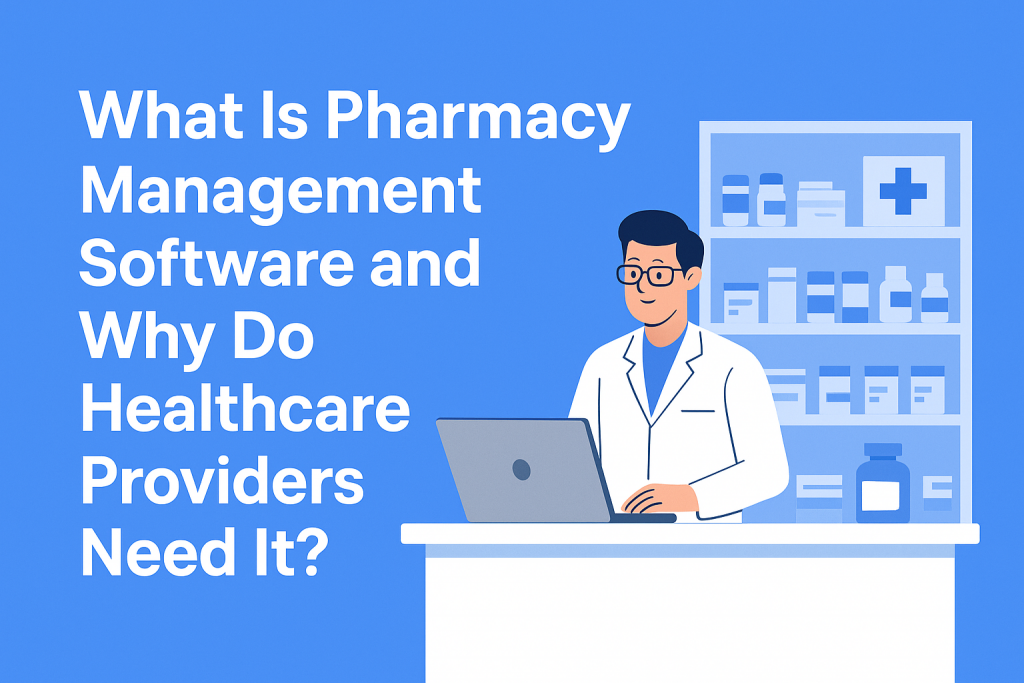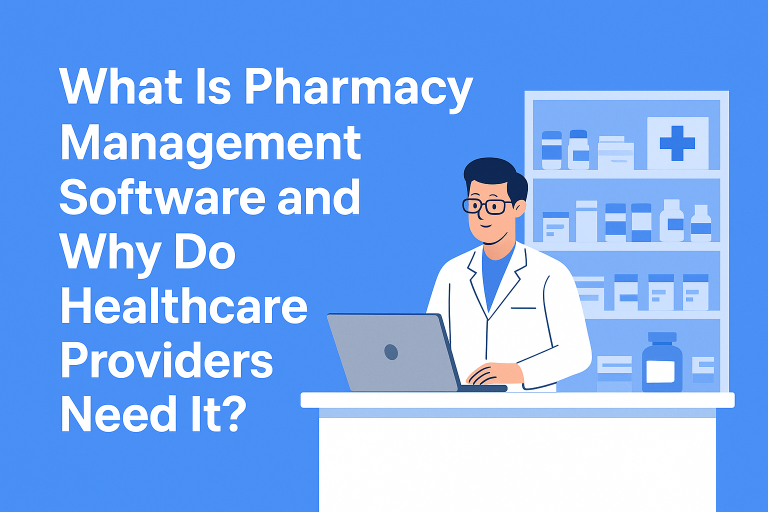The healthcare sector is rapidly evolving, and with it, the need for innovative digital tools has become more important than ever. Among these innovations, pharmacy management software has emerged as a cornerstone for pharmacies, hospitals, and healthcare professionals. But what exactly makes this technology so essential? How does it simplify complex operations, improve patient safety, and contribute to overall growth?
In this blog, we’ll answer these questions in detail while also exploring the role of laboratory software, hospital management software, and even hospital software in driving efficiency.
Whether you’re a healthcare provider, a pharmacist, or someone planning to integrate new digital solutions, this blog will guide you through the “what, why, and how” of pharmacy management solutions.
What Is Pharmacy Management Software?
At its core, pharmacy management software is a digital solution designed to streamline the day-to-day operations of pharmacies. From inventory management to billing, prescription handling, and patient data storage, it automates and organizes tasks that would otherwise consume hours of manual work.
Moreover, this software goes beyond basic operations. It provides analytics, helps in compliance with healthcare regulations, and reduces medication errors, which directly enhances patient safety. The adoption of such technology is not just about convenience—it’s about reshaping how pharmacies function in the modern healthcare ecosystem.
Why Is Pharmacy Management Software Important in Today’s Healthcare System?
The rising number of prescriptions, patient visits, and compliance requirements have made traditional methods outdated. Pharmacy management software ensures that pharmacies can manage high volumes without compromising accuracy or efficiency.
Additionally, the system empowers pharmacists to focus more on patient care rather than administrative tasks. For example, automated alerts about drug interactions or low stock levels improve both safety and reliability. This means pharmacies not only serve better but also gain a competitive edge.
How Does Pharmacy Management Software Work?
Understanding the “how” is as important as knowing the “why.” The functionality of pharmacy management software can be broken down into three stages:
- Data Entry and Storage – Prescriptions are entered and stored securely.
- Automation – Tasks like billing, stock updates, and refill reminders happen automatically.
- Reporting and Analytics – Insights are provided to enhance decision-making and predict trends.
Through these steps, pharmacies gain real-time visibility of their operations, which boosts both productivity and profitability.
The Role of Laboratory Software in Healthcare
While pharmacies handle prescriptions, laboratories form the backbone of diagnostic care. This is where laboratory software becomes vital. Such systems streamline test scheduling, sample tracking, and result reporting.
For instance, consider a patient who comes to the hospital for several services. With laboratory software, their diagnostic reports can be integrated seamlessly with pharmacy systems. By doing this, the patient trip is improved overall, consistency is guaranteed, and duplication is decreased.
Exploring Hospital Management Software
Healthcare organizations need a holistic view of all their processes, and this is where hospital management software comes in. While pharmacy management focuses on prescriptions and stock, hospital management systems oversee everything—appointments, staff scheduling, billing, and even laboratory management.
By adopting hospital management software, hospitals can create a well-connected ecosystem where pharmacies, laboratories, and doctors collaborate seamlessly. Better efficiency, lower expenses, and higher patient satisfaction result from this.

Hospital Software and Its Synergy with Pharmacies
Pharmacies do not operate in isolation—they are often part of a larger healthcare network. Hospital software bridges this gap by integrating pharmacy operations with other departments.
For example, when a doctor prescribes medication, the hospital’s digital system can send the prescription directly to the pharmacy. This reduces errors, saves time, and creates a seamless link between care providers and patients. The synergy between hospital and pharmacy systems also builds trust, as patients feel more supported and informed.
Benefits of Pharmacy Management Software
Let’s look at some specific advantages that make pharmacy management software a must-have:
- Efficiency Boost: Tasks like billing, stock checks, and prescription management become faster.
- Error Reduction: Automated checks prevent medication errors.
- Regulatory Compliance: Pharmacies can easily follow healthcare laws.
- Customer Satisfaction: Patients receive timely medications and accurate information.
- Data Insights: Reports and analytics guide future strategies.
These benefits not only streamline operations but also help pharmacies grow in a competitive market.
Why Should Businesses Invest in Pharmacy Management Software?
Businesses in the healthcare domain are constantly under pressure to reduce costs while improving care. Investing in pharmacy management software ensures that resources are optimized, waste is minimized, and patients are satisfied.
Moreover, digital transformation is no longer optional—it’s a necessity. Pharmacies that still rely on paper records and manual processes risk being left behind in an era where speed, accuracy, and data-driven insights are crucial.
How to Choose the Right Pharmacy Management Software?
Selecting the right software requires careful consideration. Here are some key factors to keep in mind:
- Scalability: Is the program able to expand along with your company?
- Integration – Does it connect with hospital management software and other healthcare tools?
- Ease of Use: Can employees easily adopt it?
- Security: Does it adhere to regulations for protecting patient data?
- Support and Training – Will the provider offer assistance during and after implementation?
By considering these aspects, healthcare providers can ensure that they invest in a system that supports their long-term growth.
Emerging Trends in Pharmacy Management Software
The future of pharmacy management software is moving toward even greater innovation and intelligence. With advancements in artificial intelligence, cloud computing, and automation, pharmacies will be able to predict demand, manage inventory in real time, and deliver highly personalized care to patients. For example, smart algorithms can forecast which medicines will be in high demand based on seasonal trends or patient history, ensuring that stockouts are minimized.
Additionally, as healthcare becomes more patient-centered, these systems will support personalized treatment plans, faster prescription fulfillment, and seamless communication between pharmacies, hospitals, and laboratories. In the coming years, implementing pharmacy management tools will no longer be optional—it will be the benchmark for delivering efficient, safe, and patient-friendly healthcare services.
Frequently Asked Questions (FAQs)
Q1. What is pharmacy management software?
It is a digital solution that automates and manages the daily operations of a pharmacy, including inventory, prescriptions, and billing.
Q2. How is pharmacy management software different from hospital management software?
Pharmacy software focuses on prescriptions and drug management, while hospital management software manages multiple hospital departments, including pharmacy, labs, and administration.
Q3. Can pharmacy management software integrate with laboratory software?
Yes, integration ensures smooth data sharing between pharmacies, labs, and doctors, which improves patient outcomes.
Q4. Is hospital software necessary if I already use pharmacy software?
Yes, hospital software offers a comprehensive solution, while pharmacy software focuses only on medication and inventory. Together, they create a seamless healthcare ecosystem.
Q5. How does pharmacy management software improve patient safety?
It minimizes errors through automated alerts, accurate prescription handling, and real-time inventory updates.
Conclusion
To sum up, pharmacy management software is no longer just a luxury—it’s an essential part of modern healthcare growth. By automating tasks, reducing errors, and integrating with laboratory software, hospital management software, and even hospital software, it creates a connected healthcare environment.
For healthcare providers and pharmacies, adopting this technology means not just keeping pace with industry changes but leading the way toward efficiency and patient satisfaction. As healthcare continues to evolve, embracing these digital solutions will ensure long-term growth, trust, and success.

